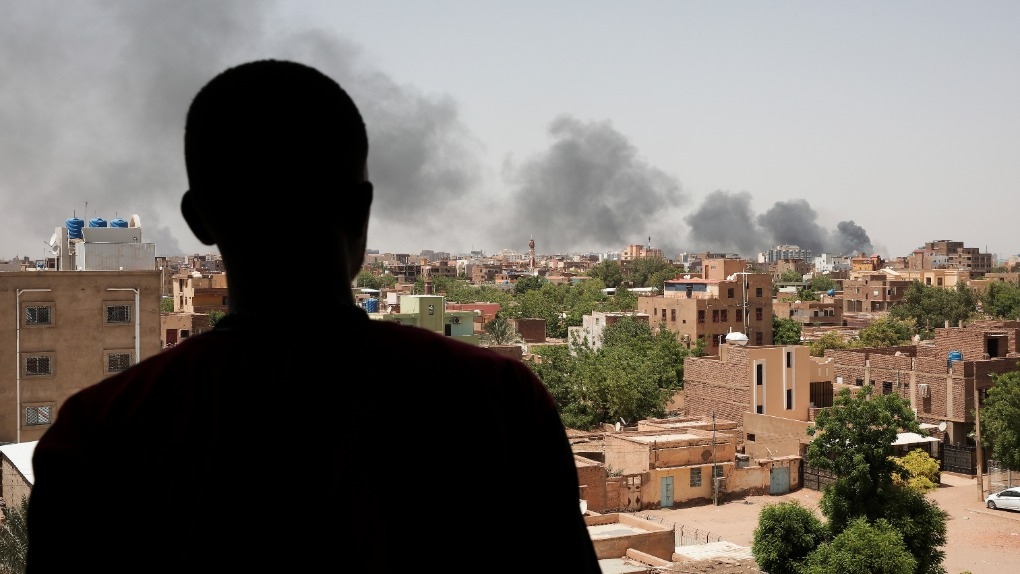Ottawa deploys rapid deployment team to Djibouti to provide emergency response
The Canadian Press · Posted: Apr 21, 2023 11:10 PM EDT | Last Updated: April 21

Minister of Foreign Affairs Mélanie Joly, pictured in Ottawa last month, says the Canadian Embassy in Sudan's capital, Khartoum, has temporarily suspended in-person operations due to security concerns. (Justin Tang/The Canadian Press)
The federal government says it has deployed members of its Global Affairs Standing Rapid Deployment Team to Djibouti due to the volatile and rapidly deteriorating situation in Sudan.
Foreign Affairs Minister Mélanie Joly said the Canadian Embassy in Sudan's capital, Khartoum, has temporarily suspended in-person operations.
The Rapid Deployment Team can provide emergency response, co-ordination, consular assistance and logistical support, she said.
The federal government says the Department of National Defence and the Canadian Armed Forces are also planning for contingencies but gave no further details.
Roughly 1,500 Canadians registered in Sudan
On Thursday, Joly said Canada has no means of evacuating citizens from Sudan, where violence has drastically escalated between the country's army and its rival paramilitary force.
Global Affairs Canada has said it knows of roughly 1,500 Canadians registered as being in the northeast African country.
"The situation in Sudan is volatile and deteriorating rapidly," Joly said in a news release on Friday. "Canada continues to call for an end to violence and stands with the Sudanese people as they strive for peace.
"We are actively monitoring the situation in Sudan and working with neighbouring countries, as well as with like-minded governments and the international community to co-ordinate the response to this crisis."

Smoke fills the sky in Khartoum on Friday. Joly said Canada has no means of evacuating citizens from Sudan, where violence has drastically escalated between the country's army and its rival paramilitary force. (Maheen S./The Associated Press)
Joly said consular services remain available to Canadians in Sudan, but due to the security situation, these could be limited.
Officials in Ottawa are in regular contact with Canadians there, providing them with information and advice as the situation develops, she said.
The United States and other countries anticipate the violence to escalate and have been preparing to evacuate their citizens in Sudan.
Some of the heaviest fighting has been over airports.
The Pentagon has moved a small number of troops to a base in Djibouti to support an evacuation.
Gen. Mark Milley, chair of the U.S. joint chiefs of staff, discussed the situation with defence officials from Germany, Italy and Canada at a gathering in Germany on Friday, a U.S. official said.
One topic was ensuring that any potential evacuation efforts did not conflict. The official spoke on condition of anonymity to describe the deliberations.
The Canadian Press · Posted: Apr 21, 2023 11:10 PM EDT | Last Updated: April 21

Minister of Foreign Affairs Mélanie Joly, pictured in Ottawa last month, says the Canadian Embassy in Sudan's capital, Khartoum, has temporarily suspended in-person operations due to security concerns. (Justin Tang/The Canadian Press)
The federal government says it has deployed members of its Global Affairs Standing Rapid Deployment Team to Djibouti due to the volatile and rapidly deteriorating situation in Sudan.
Foreign Affairs Minister Mélanie Joly said the Canadian Embassy in Sudan's capital, Khartoum, has temporarily suspended in-person operations.
The Rapid Deployment Team can provide emergency response, co-ordination, consular assistance and logistical support, she said.
The federal government says the Department of National Defence and the Canadian Armed Forces are also planning for contingencies but gave no further details.
Roughly 1,500 Canadians registered in Sudan
On Thursday, Joly said Canada has no means of evacuating citizens from Sudan, where violence has drastically escalated between the country's army and its rival paramilitary force.
Global Affairs Canada has said it knows of roughly 1,500 Canadians registered as being in the northeast African country.
"The situation in Sudan is volatile and deteriorating rapidly," Joly said in a news release on Friday. "Canada continues to call for an end to violence and stands with the Sudanese people as they strive for peace.
"We are actively monitoring the situation in Sudan and working with neighbouring countries, as well as with like-minded governments and the international community to co-ordinate the response to this crisis."

Smoke fills the sky in Khartoum on Friday. Joly said Canada has no means of evacuating citizens from Sudan, where violence has drastically escalated between the country's army and its rival paramilitary force. (Maheen S./The Associated Press)
Joly said consular services remain available to Canadians in Sudan, but due to the security situation, these could be limited.
Officials in Ottawa are in regular contact with Canadians there, providing them with information and advice as the situation develops, she said.
The United States and other countries anticipate the violence to escalate and have been preparing to evacuate their citizens in Sudan.
Some of the heaviest fighting has been over airports.
The Pentagon has moved a small number of troops to a base in Djibouti to support an evacuation.
Gen. Mark Milley, chair of the U.S. joint chiefs of staff, discussed the situation with defence officials from Germany, Italy and Canada at a gathering in Germany on Friday, a U.S. official said.
One topic was ensuring that any potential evacuation efforts did not conflict. The official spoke on condition of anonymity to describe the deliberations.


